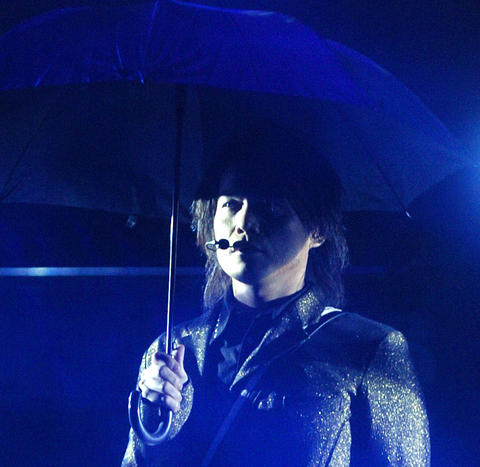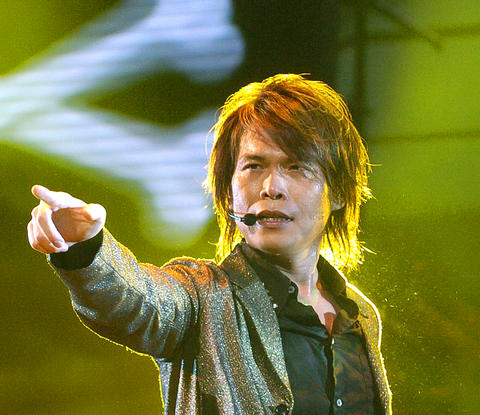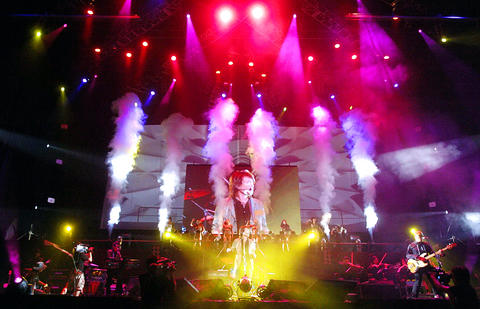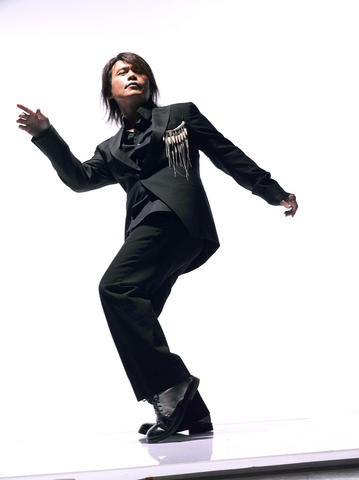Wu Bai (伍佰) and China Blue, who made live, guitar-oriented rock 'n' roll popular in Taiwan, kick off a four-city tour starting at the end of this month and tickets are expected to sell out quickly. Labeled "the king of live music," Wu Bai is one of the biggest pop music stars in East and Southeast Asia, though he has also maintained a measure of local street credibility as the epitome of taike (台客) chic. Once a derogative appellation used to refer to someone with a low-class attitude or style, taike has now been subverted and has gained street credibility
With his distinctive helmet hair, powerful blues-oriented chords and lyrics in Hoklo and Mandarin, Wu Bai emerged in the mid-1990s as the figurehead of Taiwanese rock 'n' roll, packing stadiums with crowds of up to 100,000 and generating record sales of more than 600,000 copies for his most popular albums. Along with May Day (五月天) and Back Quarter (四分衛), Wu Bai and his band - bassist Ju Jian-hui (朱劍輝), drummer Dean "Dino" Zavolta and keyboard player Yu Dai-ho (余大豪) - are one of the few big-time local acts with garage-band roots.
At 39, Wu Bai, whose monikers include the "cult master" and the "king of Chinese rock," has released a dozen studio albums with China Blue. He's also acted in four movies and served as a spokesman for Taiwan Beer. "I pursue light and heat. I like this kind of beautiful lavish life. So I push myself, burn myself, and see how far I can go," he wrote in his biography/photo album retrospective Moonlight Symphony (月光交響曲).

With his Taiwanese-accented Mandarin and rock star looks, Wu Bai, whose real name is Wu Chun-lin (吳俊霖), projects the image of the archetypical taike. Since the first TK Rock concert (台客搖滾嘉年華) in 2005, he has enjoyed new popularity as Taiwanese who are proud of their heritage embrace elements of the country's working-class culture.
Wu Bai and China Blue have a uniquely Taiwanese take on rock 'n' roll, with influences like puppet theater (布袋戲) and old TV variety shows. Zavolta said they favor "more of an Asian pop rock 'n' roll style" that combines power chords with groovy bubble gum pop. "We try to stay on the cutting edge musically and try to keep it real, but still have a certain sound," he said. China Blue was formed in 1991 by Zavolta and Ju, who soon met a then-pudgy young guitarist named Wu Bai. They got their first big break in 1992, when they wrote two songs for a movie soundtrack. Their most popular album, 1996's The End of Love (愛情的盡頭), has sold more than 600,000 copies.
Fans can expect some new material mixed with old hits at the band's upcoming concerts, Zavolta said, but a new album is currently not in the works. "I don't know what we're coming up with next," he said. "I don't know what Wu Bai has up his sleeve."




Taiwan has next to no political engagement in Myanmar, either with the ruling military junta nor the dozens of armed groups who’ve in the last five years taken over around two-thirds of the nation’s territory in a sprawling, patchwork civil war. But early last month, the leader of one relatively minor Burmese revolutionary faction, General Nerdah Bomya, who is also an alleged war criminal, made a low key visit to Taipei, where he met with a member of President William Lai’s (賴清德) staff, a retired Taiwanese military official and several academics. “I feel like Taiwan is a good example of

March 2 to March 8 Gunfire rang out along the shore of the frontline island of Lieyu (烈嶼) on a foggy afternoon on March 7, 1987. By the time it was over, about 20 unarmed Vietnamese refugees — men, women, elderly and children — were dead. They were hastily buried, followed by decades of silence. Months later, opposition politicians and journalists tried to uncover what had happened, but conflicting accounts only deepened the confusion. One version suggested that government troops had mistakenly killed their own operatives attempting to return home from Vietnam. The military maintained that the

Before the last section of the round-the-island railway was electrified, one old blue train still chugged back and forth between Pingtung County’s Fangliao (枋寮) and Taitung (台東) stations once a day. It was so slow, was so hot (it had no air conditioning) and covered such a short distance, that the low fare still failed to attract many riders. This relic of the past was finally retired when the South Link Line was fully electrified on Dec. 23, 2020. A wave of nostalgia surrounded the termination of the Ordinary Train service, as these train carriages had been in use for decades

Lori Sepich smoked for years and sometimes skipped taking her blood pressure medicine. But she never thought she’d have a heart attack. The possibility “just wasn’t registering with me,” said the 64-year-old from Memphis, Tennessee, who suffered two of them 13 years apart. She’s far from alone. More than 60 million women in the US live with cardiovascular disease, which includes heart disease as well as stroke, heart failure and atrial fibrillation. And despite the myth that heart attacks mostly strike men, women are vulnerable too. Overall in the US, 1 in 5 women dies of cardiovascular disease each year, 37,000 of them